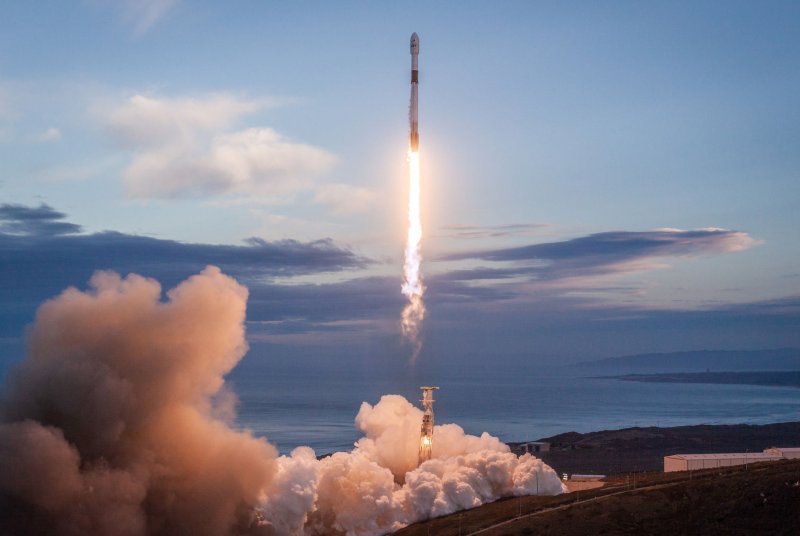SpaceX successfully launched the eighth and final set of satellites for Iridium’s next-generation global satellite constellation, Iridium NEXT, on January 11 from Vandenberg Air Force Base in California. Photo by SpaceX/UPI |
License Photo
Feb. 12 (UPI) -- With China and Russia making advances in space technology, a U.S. intelligence report warns their efforts pose a significant military challenge to the United States and its allies.
"Challenges to Security in Space," which was released Tuesday by the Defense Intelligence Agency, said the United States needs to stay ahead of Russia and China in the space race because it's the next battlefield.
"Having seen the benefits of space-enabled operations, some foreign governments are developing capabilities that threaten others' ability to use space," DIA officials wrote in the report. "China and Russia, in particular have taken steps to challenge the United States."
Last year, U.S. President Donald Trump proposed the creation of a space force. And in October, Vice President Mike Pence told the National Space Council that the administration plans to launch the United States Space Force, the nation's sixth military branch, by 2020.
In 1967, the Outer Space Treaty banned the deployment of weapons of mass destruction into space or installing such weapons on celestial bodies. It has been ratified by more than 100 countries, including the United States, Russia, China and North Korea. Other weapons are not banned, as noted in the treaty and the later 1979 SALT II Treaty.
But that's not stopping Russia and China from military space technology developments.
"Chinese and Russian doctrine indicate that they view space as important to modern warfare and view counterspace capabilities as a means to reduce U.S. and allied effectiveness," a senior official told reporters on background during a Department of Defense briefing. "China views space superiority as part of the ability to control the information sphere and that is a key component of modern warfare."
And Russia sees future warfare based on winning the battle in orbit, he said.
China has demonstrated an anti-satellite missile and is working on a laser that could attack U.S. properties in space. Russia is focused on energy-weapons, including lasers or high-powered microwaves, that can disable or destroy objects in space.
Russia's mobile, ground-based weapon system "capable of destroying space targets is likely to be operational within the next several years," the report warns.
"What concerns me the most is them having a holistic force," a U.S. defense intelligence official told NBC News. "We need to be postured to address these challenges or we do risk losing our advantages in space. We are at risk unless we posture ourselves properly."
The United States has the most operational satellites, ahead of No. 2 China and No. 3 Russia.
"Both countries have developed robust and capable space services," the report said. "These capabilities provide their militaries with the ability to command and control their forces worldwide and also with enhanced situational awareness, enabling them to monitor, track, and target U.S. and allied forces."
Their space surveillance networks can search, track and characterize satellites in all Earth orbits.
China and Russia "reorganized their militaries in 2015, emphasizing the importance of space operations," the report said.
That includes China establishing "a strategic support force to integrate its space, cyberspace and electronic capabilities," the official said.
China's Foreign Ministry, however, said the U.S. allegations were "groundless."
"Recently the U.S. has defined outer space as a battlefield and announced the establishment of an outer space force," spokeswoman Hua Chunying said at a briefing in Beijing. "So this may lead to the reality of the weaponization and endangerment of outer space."
In September 2018, after Trump's announcement of the Space Force, Moscow warned Washington against deploying weapons in space and urged the international community to adopt an agreement preventing such deployments.
The report notes the space threat posed by North Korea and Iran, who have demonstrated satellite jamming as well, and touches on the growing problem of space junk.
"As the number of satellites grows, so does the threats posed by space debris," the official said. "That makes tracking satellites and discriminating satellites from threats and nonthreats and predicting and preventing collisions more challenging."
China's debris technology is "dual-use because it could be used to damage another satellite," according to DIA.
About 1,800 of the 21,000 large objects in space -- those measuring at least four inches -- are satellites, with the rest as debris, including parts of spacecraft, according to the report.
Of that space junk, more than a third is from China's use of a missile in 2007 to destroy a defunct satellite and the accidental collision between a U.S. communications satellite and a defunct Russian one in 2009, Bloomberg reported.
A Space Foundation report placed the global space economy at nearly $4 billion in 2017. About 57 percent of global government space spending and 65 percent of all space launches came from the U.S.
"Space is fundamental to U.S. prosperity," the Pentagon official said. "The United States harnesses the benefits of space for communications, financial transactions, public safety, weather, agriculture, navigation and more. Additionally, there is a wave of exciting commercial technologies and investments in space that are expanding the potential opportunities, the benefits we can all enjoy."















